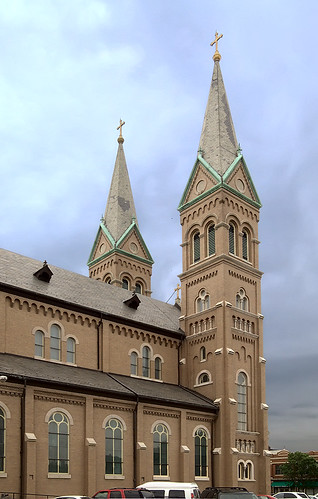
According to the parish's Guide to the Church and its Ecclesiastical Art:
St. Anthony's conforms the best laws of ecclesiastical art by combining many beautiful details into a harmonious pattern. It creates the impression of massiveness when viewed from the exterior. Two square, well-proportioned Romanesque towers add to this impression. Inside, however, the church's massiveness seems to melt away by interior of light and color, for a general result of warmth, beauty, and grandeur. Its harmonious pattern will become more apparent as the single murals and windows are viewed in the ideas the designers had in mind.
The architectural style of the church is Romanesque, borrowed from some representative copy of this architecture in the German Rhineland. Romanesque style's chief characteristic traits are the rounded arch, the floor plan in the form of a cross and rounded vaulted ceilings, with the circle and curved line prevailing throughout.
St. Anthony's was erected in 1910 at a cost of $175,000 — unbelievable at today's building costs. And it was completely paid for by 1919. In fact, on Thanksgiving Day in 1919, the church was consecrated. (Only a church that is completely paid for may be consecrated.) Once a year on the anniversary of its consecration, the twelve candles at various places throughout the church are lit.
The columns (or pillars) in the church are made from plaster with a steel beam, painted to resemble marble. This type of painting is almost a lost art — only one man in the country is now known to be able to do it.
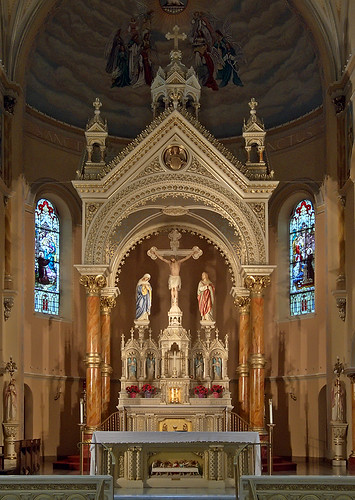
From the parish website:
The long history of St. Anthony's begins in 1863 when the first Eucharist was celebrated by Fr. Servace Altmicks, O.F.M. in a house donated by Mr. Whitnell. From these humble beginnings the parish began to grow and the first church was built on the corner of Meramec Street and Compton Avenue. That first church was consecrated by Bishop Hogan in 1869.It ought to be noted that although this is a fairly small parish, this church has many friends and benefactors, including those who formerly lived in the neighborhood.
The value of education of the children of the parish took a big step forward with the building of the first parish school in the year 1870. In 1883, the Sisters of St. Joseph of Carondelet joined the parish and have served it faithfully ever since through their teaching ministry.
As the parish grew and prospered, a new church was begun in 1908 and was completed in 1910. Archbishop Glennon celebrated the first Mass there. This is our present church building used by St. Anthony's community.
There are currently about 480 households registered in the parish.
Note the copy of the crucifix of San Damiano, which led to the conversion of Saint Francis of Assisi. Unusual for Italy, the original crucifix-icon was probably made by a Syrian monk.
Statue of Saint Francis.
These choir stalls were hand made by the early German friars.
ADORATIO
GRATIARUM ACTIO
Adoration
Thanksgiving
The view of the high altar from the chapel.
The tabernacle.
This tile floor in the sanctuary is original to the church and has been recently restored. Note the tiles include the design elements of the fleur-de-lis and the Greek cross fleurée. Click here for a close-up view of the tiles.
Next to the pulpit is a statue of Saint Francis, founder of the Franciscans. This church has unusual edge lighting, used during weddings.
Priest's chair.
Altar of Saint Joseph; to the left is one of the church's several elaborately carved confessionals.
Altar to the Sacred Heart of Jesus.
Saint Anne with the child Mary is above the icon of Our Mother of Perpetual Help.
Christ the good shepherd, removing one of his flock from the thorns.
These stained glass windows include an abstract floral pattern, the Coronation of Mary as Queen of Heaven, and Saint Philip. The windows are the work of Emil Frei.
Murals run along entablature over the arches of the side-aisles. Due to time constraints, I was unable to take any close-up photographs of these paintings.
Address:
3140 Meramec Street
Saint Louis, Missouri 63118


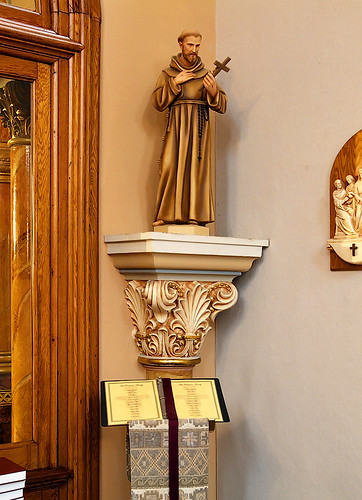





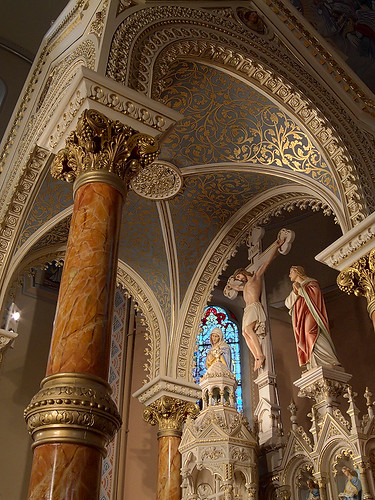



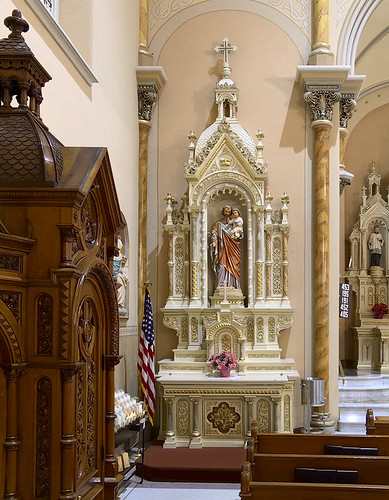
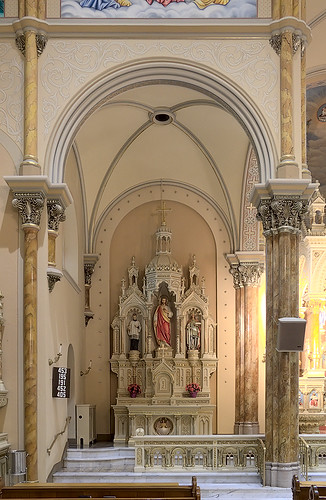
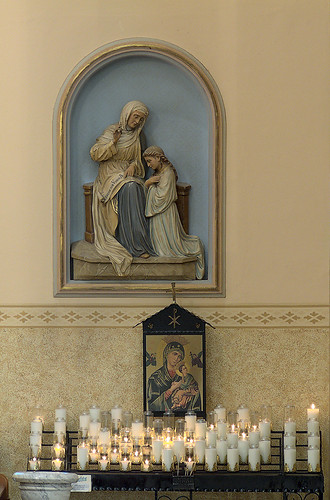

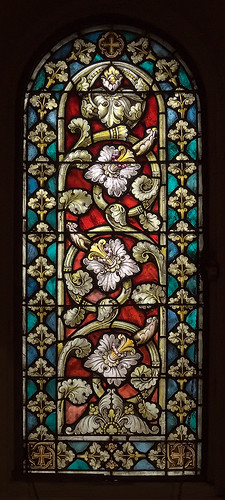
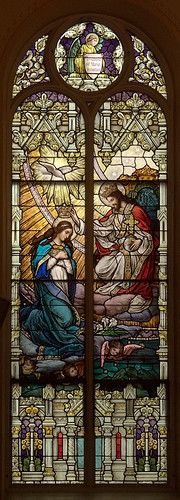
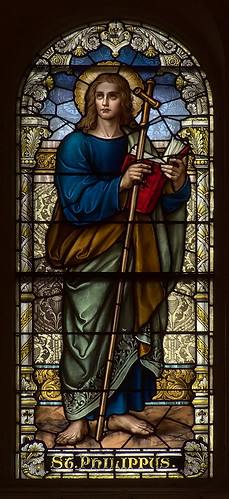



It's worth noting that this church suffered a terrible fire in the mid-1990s. The photos you posted are the result of the renovation that took place after the fire. A most impressive testament to the local Franciscan community and surrounding parish.
ReplyDeleteI found the murals you put up last to be the best part. I find the neo-Baroque too gaudy for me. I do understand it, but when I was there I felt it was too busy.
ReplyDeleteBeautiful. When do you think Burke will sell it off to pay the victims of the Catholic clergy sex scandal? Just wondering.
ReplyDeleteI am loving seeing all the photos of Saint Anthony's here. Regarding the murals: the murals along the nave feature many saints. They are saints for whom most parishioners were named in the 1920s when this Church was completed.
ReplyDeleteI forget what the larger Gospel panels represent, I think maybe they are Mysteries of the Rosary. I think the nave windows are also Glorious Mysteries of the rosary.
The West Transept (partially pictured) tells the story of Saint Anthony's life. The East Transept tells the story of Saint Francis.
The Rose window facing North (above the choir loft) features angels with saints and bible figures connected with music (Cecilia, David, etc.)
My favorite feature is opposite the sanctuary statue of Saint Francis depicted above.
A statue of Saint Clare with the monstrance, protecting the sanctuary the way she is said to have protected her convent from raiding "Barbarians" in Assisi is present.
I used to give tours when I lived and worked in St. Louis at Saint Anthony's. My last few visits, alas, have been funerals, so I haven't taken much notice of the art.
Most of what I know was taught to me by Father Kenneth Rosswog OFM
Mick, What a cynical view! Social Justice demands that such punitive lawsuits should not be allowed.
ReplyDeleteThank you for the beautiful pictures. I grew up in this parish and appreciate you taking the time to capture its beauty! There was nothing quite like midnight Mass in the 1970's when the church was packed to the walls and every lightbulb in the church was lit!
ReplyDeleteThank you for the beautiful pictures of this magnificent church. Our Carondelt Women's Chorus rehearsed and performed there this past week. We stood in the sanctuary and thus were afforded some incredible views and sights. Thanks again for your work.
ReplyDeleteWow, what a beautiful church. Next time I am in St Louis, I am going to go to Mass there. Thanks for sharing these.
ReplyDeleteThanks for sharing! Very nice. This was my maternal family's parish. My parents were married here in 1946. My uncle, Louis Schaum, was music director and organist for many years. Only have one negative thing to say and it's not the church's fault. My cousin was married here in 1982. During her wedding, the room where the bride & her attendants prepared was entered and contents of their purses that had been left there were removed. Unfortunately, nearly 30 years later, this type of activity has become the norm.
ReplyDeleteCame across an old photo of St. Anthony's you might like. I thought it was one of ours here in Evansville, but the stonework and second story look more like this church.
ReplyDeleteIt was misidentified in an ebay auction. Photo dated 1916
http://historicevansville.com/image.php?id=religious%2FSt+Anthony+Catholic+-+ceremony+%281916%29.jpg
What a beautiful church!
ReplyDeleteI've come to be amazed by how frequent St. Anthony of Padua is remembered in American churches. In my diocese, the Diocese of Cheyenne, there are two, one being in Casper Wyoming and the other being in Cody Wyoming. That two churches in the same rural Western diocese would have been dedicated in memory of St. Anthony of Padua surprises me, and the extent to which there are numerous other ones across the nation also does.